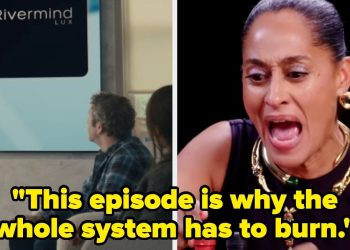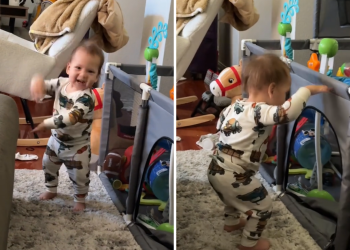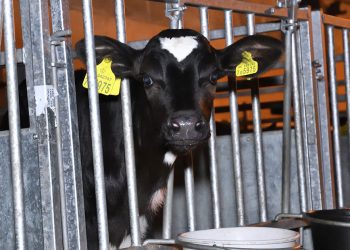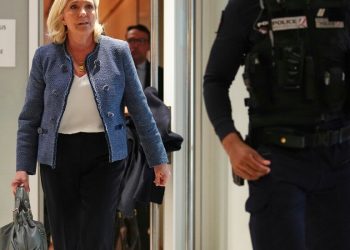It was mid-afternoon on October 14 when Ayman Alsayed got the call. It was his brother, Diaa, on the phone from Gaza City, seven hours ahead of where Ayman was in the U.S. Diaa was OK, but there had been an airstrike on their family house in Jabalia. Some of their loved ones had been killed, including their mother, Zahia. Others had survived — and were now stranded in the remnants of the building.
“He told me about my brother: ‘He can’t move and he’s wounded,’” Ayman recalled of Diaa’s desperate pleas for their injured brother Ashraf. “He told me, ‘Please, please — if you can do anything from America to help the family.’”
Ayman did not have many options.
“I didn’t know what to do,” he said. “We know it’s impossible to find somebody to help from here. But we did our best.”
With each avenue he tried, Ayman kept coming up empty. Finally, there was a breakthrough: A friend put him in touch with the head of a D.C. nonprofit who had a contact at the White House. Ayman gave them the address and coordinates to the home.
“We sent this so they can pass it to the Israelis to let the ambulance take the people,” Ayman said.
In Gaza, daylight was fast approaching. Diaa Alsayed was still in touch with his surviving family in Jabalia. Some of the stranded relatives had been bleeding for hours. Around 7:30 a.m., a local doctor finally managed to get into their house and take the injured children away. The doctor said he would return to help the surviving adults get out.
“Did you give them the coordinates?? They just hit the house again!”
About 15 minutes later, Diaa got devastating news. The doctor and most of the children had been killed. And the house had been attacked again. Only one of his brothers and his nephew had survived.
The news of the attack quickly made its way around the globe to Ayman Alsayed and his wife Rachel. On a group chat with the nonprofit official who had passed their family’s location to the White House, Rachel wrote, “Did you give them the coordinates?? They just hit the house again!”
Attempts to save civilians in Gaza routinely end with those very civilians being targeted. Israel has repeatedly attacked emergency and aid workers whose locations were given to its military as part of requests for safe passage. It’s a constant reminder to Palestinians that no safety exists for them.
The name of Hind Rajab, a 6-year old girl, became a rallying cry for global opposition to the war after audio of her pleas for help went viral. The Red Crescent ambulance that had received Israeli approval to rescue her was attacked just as it reached her. In April, an airstrike killed seven aid workers with World Central Kitchen despite, the organization said, coordination for their car travel with the Israeli military.
Ensuring safe passage is common in war, but in Israel’s campaign against Gaza it has proven to be a risk, not a guarantee of security. In May, Human Rights Watch said that the attack on the World Central Kitchen workers was not an isolated incident; it was one of at least eight strikes where aid groups and the United Nations “had communicated with Israeli authorities the GPS coordinates of an aid convoy or premises and yet Israeli forces attacked the convoy or shelter without any warning.”
Israel “knew that they could do all of this without any serious pressure by the White House.”
In addition, the Israeli military has struck ambulances and killed emergency workers throughout the war. This was the lethal combination the Alsayed brothers were up against as they tried to save their family. Assistance from the White House seemed extraordinary, but it wouldn’t end up helping at all. According to Nihad Awad, the executive director of the Council on American-Islamic Relations, the second attack, despite the White House’s involvement, speaks to Washington’s inability to deal with allegations of civilian harm by the Israeli military.
“They knew that they could do all of this without any serious pressure by the White House,” Awad told The Intercept. “The White House — by this very action that they gave the information to the Israelis, they’re showing that they’re incompetent. They don’t have the resolve to hold Israel to account.”
For Ayman Alsayed, in the U.S., the idea that his attempts to help his loved ones ended this way has left him with a profound guilt.
“It’s difficult to express how I felt,” Ayman said. “This is what I believe: that I hurt my family, not helped them, by giving all this information to the embassy who passed the information to the Israelis. And instead of bringing safe passage for the ambulance to come, they attacked the house again using the coordinates we gave them.”

Photo: Mahmoud Issa/Anadolu via Getty Images
Months before the October attack that nearly wiped out what remained of his family, Diaa Alsayed already knew loss. His wife and six of his children had been killed in an Israeli airstrike in Jabalia.
On the night of October 14, the first airstrike on his family home, Diaa was in Gaza City with his only surviving child, his daughter Tala, when he received the call around 9 p.m. from his sister-in-law Sumaya.
“‘Help me, help me!’” she had said, Diaa told The Intercept. “‘Call an ambulance! Call somebody! Two of my children have been martyred.’” She told Diaa that his mother had been killed and that the surviving family needed urgent help.
At the time, the Israeli military was about 10 days into its ongoing siege of northern Gaza. The onslaught had hit the Jabalia refugee camp particularly hard. U.N. officials were already warning of horrific conditions, with tens of thousands of people cut off from aid and countless civilians killed and wounded. Long before the siege, the capacity of hospitals and emergency systems had been decimated, but now access to care had become even more daunting.
“I tried calling for help, but the ambulance service said it was out of their hands,” Diaa said. “They couldn’t enter the area because it was too dangerous, the ambulances were being targeted.”
Sumaya, Diaa and Ayman Alsayed’s sister-in-law, sought help from emergency workers herself. In a recording of a call from that night, she explained to the dispatcher that she and the other survivors couldn’t get out of the house. No one had been able to come help them.
“Be careful, the army is not far from you,” Fares Afana, the emergency worker, told her. “Until now, we cannot reach you. And this is — I swear to God — wrecking our hearts.”
“Unfortunately the story of this family is among dozens of stories,” said Nebal Farsakh, a spokesperson for the Palestine Red Crescent Society. “From previous experiences when we had even coordinated access for the staff, many times the ambulance was targeted despite being part of coordinated missions.”
Meanwhile, Diaa was still looking for a way to save his family. He turned to journalists.
“I wanted to draw attention to the unfolding tragedy,” he said, “and enable coordination with organizations like the Red Cross or emergency services.”
He called Al Jazeera’s correspondent in Jabalia, Anas al-Sharif. In a video of the call with al-Sharif posted to Instagram, Diaa explains that his relatives were killed or injured, and no ambulances could get to the survivors.
“The rescue teams also contacted me just now,” al-Sharif responds to Diaa. “They can’t move because of the shelling.”
In the U.S., Ayman Alsayed and his wife Rachel were trying to figure out what to do. Getting an ambulance to their family in Jabalia would require approval from Israeli authorities. The Alsayeds tried calling the Red Crescent, but they confirmed what Diaa had been told: Red Crescent ambulances couldn’t get past the Israeli military.
Then, as American citizens, Ayman and Rachel turned to the U.S. Embassy in Jerusalem, but it was already nighttime there. The only office open was an emergency duty desk — unlikely to have a direct line to the Israeli military.
With the clock ticking, they decided to ask friends if they knew anyone who could help. The outreach would eventually bring them to Sean Carroll, the director of the nonprofit Anera. Carroll, whose group provides food and medical aid in Gaza, quickly reached out to a contact at the White House, he said, and got an immediate reply.
“They were asking for coordinates,” Carroll told The Intercept. Working with the Alsayed family and his colleagues on the ground, Carroll provided the information to a National Security Council official. “We tried to provide coordinates, but also a description of where the house was. So the NSC passed those on.”
He also contacted the Israeli military’s office of Coordination of Government Activities in the Territories, or COGAT, which administers Palestinian civilian life in the occupied territories, including emergency and medical logistics. Carroll didn’t get an immediate response, but, with the White House trying to help, the silence from COGAT wasn’t concerning.
“I wasn’t too worried about my communication with COGAT,” he said, “because I knew that the National Security Council and the embassy were in touch with them.”
A spokesperson for the National Security Council confirmed to The Intercept that White House received information about the initial attack and that multiple agencies, including the State Department, were part of the effort to try and help.
“The Administration also relayed the information received from contacts of the family to the Israeli authorities and UN, for further assistance,” the spokesperson said, though they did not elaborate on which Israeli government department or U.N. office received the information.
Carroll said his White House contact relayed to him that the U.S. Embassy in Jerusalem had passed the information to the Israeli Southern Command, the military branch whose area of responsibility includes the Gaza Strip.
Ayman Alsayed was skeptical that the White House’s involvement would help his family, given the Biden administration’s unwavering support for Israel. “But I wanted to do something, at least,” he said. “I just wanted to do anything I can.”

Photo: Courtesy of Alsayed family
By the time the White House became involved, hours had passed since the initial attack. In Gaza, Diaa Alsayed was still in touch with relatives trapped in the rubble of the house.
“All night long, I was in contact with them, and there was nothing but fear, screaming, and crying,” Diaa recalled. “My brother’s wife Sumaya kept saying, ‘My children were martyred before my eyes, and my husband is injured.’”
As the morning approached, Diaa reached out to Ahmed Al-Najjar, a doctor and family friend. With his injured relatives bleeding out, Diaa hoped Al-Najjar could help. “He called to tell me that he was preparing to evacuate the wounded and the children from the house to a safer location,” Diaa said.
“All night long, I was in contact with them, and there was nothing but fear, screaming, and crying.”
It was around 7:30 a.m. when Al-Najjar told Diaa he was going to recover the injured children first and then return for the surviving adults. It was a glimmer of hope after a long and desperate night, but it would turn out to be fleeting.
“When I called him” — the doctor — “about 15 minutes later to check on them, a stranger answered the phone and told me that Dr. Al-Najjar had been martyred,” Diaa recalled. “When I asked how it had happened, he told me that the occupation army had targeted Dr. Al-Najjar and the children he was rescuing as they tried to leave the area.”
Diaa and Ayman Alsayed’s 8-year-old nephew, Mohammed, was one of the children who had gone with the doctor. Ayman said his nephew later recounted seeing a drone following the group, and witnessed the attack that killed Al-Najjar and the other children, but managed to get away.
“They shot them, they chased them,” Ayman Alsayed said Mohammed told him. The child had fallen behind and when the attack began, and a neighbor pulled him to safety into their home. “Somebody opened the door, let him inside the house. And this is what helped him to survive.”
Stunned by news of what happened to the children, Diaa tried calling Sumaya. Instead of hearing his sister-in-law’s voice, it was Ashraf, her husband and Diaa’s brother, who answered. The house had been hit again by the Israelis, and Sumaya had been killed.
When emergency workers were finally able to reach the Alsayed home in Jabalia, they came upon the bodies of the doctor and the children in the street, according to Karim al-Hassani, one of the first responders on the scene. A video taken by emergency workers shows the bodies of several members of the Alsayed family, including the youngest, 1-and-a-half-year-old Amal, who has a trickle of blood running down her head.
After that, the rescuers went to the Alsayed home. “We went inside and found two injured people living and bleeding,” al-Hassani told The Intercept. It was Ashraf and another Alsayed brother, Hani. Hani’s injuries, however, were too extensive. “When we arrived at the hospital, he was dead.”
By morning, about 11 hours after the initial airstrike, Al-Najjar and 11 members of the Alsayed family had been killed, six of them children. The only family members that survived were Ashraf Alsayed, who is now paralyzed due to injuries from the attack, and Mohammed, his only surviving child.

Photo: Courtesy of the Alsayed family
A spokesperson for the Israeli military said they would only provide answers to questions if given the coordinates of the Alsayed family home. Due to the subject of the story, The Intercept did not provide them.
In a video sent to journalists, Fares Afana, the emergency worker who spoke to Sumaya Alsayed the night before, said, “If we had acted from the first moment, we would have been allowed to move and not endanger the ambulance and civil defense crews. If only the lives of these women and children could have been saved.”
Ashraf, the Alsayed brother who survived the attack, and his son Mohammed are currently in a hospital in northern Gaza. Ayman and Diaa said Ashraf is in constant pain. His recovery is hampered by the state of Gaza’s health care system, including from Israeli restrictions on medicine and supplies.
“There’s no real medical care here,” Diaa said from Gaza City. “He is utterly hopeless and devastated.”
Diaa also worries for his young nephew, Mohammed. “He watched his siblings turn into pieces, and he was left traumatized,” Diaa said. “He cannot sleep. He wakes up at night, screaming for his mother, father, and siblings.”
As he cares for his brother and nephew, Diaa is also trying to get better medical help for his daughter Tala — struggling herself to recover from severe burn injuries from the December airstrike that killed Diaa’s wife and other children. The only hope for his injured daughter and brother, Diaa said, would be medical evacuation, something that has become nearly impossible due to Israeli restrictions.
“We live without safety, without shelter, without hope. Every night, I search for a corner where my daughter and I can sleep,” Diaa said. “This war is not just destroying buildings; it is tearing apart lives. It has taken everything from us — our families, our homes, our dignity.”
“There are no words to capture the agony of what we are enduring.”
“I helped kill my family by paying taxes.”
Thousands of miles away, in the U.S., Ayman Alsayed must rely on spotty connectivity for calls with his surviving family. He worries about their safety, but also their future, with the Israeli siege of northern Gaza bringing new horrors every day.
The Biden administration’s continuing support for Israel, despite mounting allegations of what Amnesty International declared to be a genocide, only adds to Ayman’s stress. The distance from his family makes the pain more visceral given where he lives.
“I helped kill my family by paying taxes,” he said. “This breaks my heart.”




















